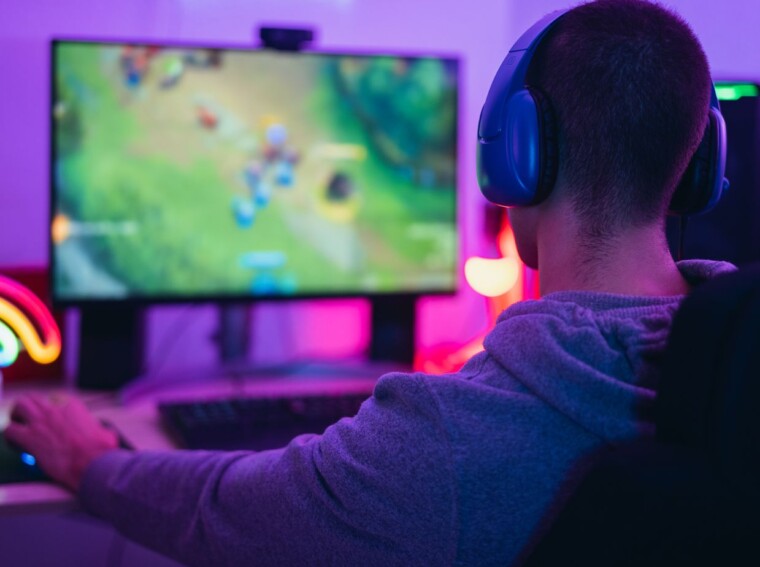✓ Online gaming was responsible for 55% of all first-party fraud incidents in 2024 — Socure
✓ Cybercriminals are targeting younger generation gamers — Kapersky
✓ Apex Legends, Fortnite, Minecraft and Roblox are some of the main games that scammers target — Kapersky
Now more than ever it’s important to stay safe when you’re gaming online.
Scammers are everywhere. Cybercriminals are capable of taking your sensitive details if you let them. And players are vulnerable now that they have so many accounts across different games.
If you’ve been around long enough, you’ll remember back in 2011 when PlayStation Network (PSN) was the victim of the largest gaming data breach of all time, impacting close to 77 million of its users. All kinds of data was stolen, including names, email addresses, and more, which led to Sony having to shut down PSN for several weeks. It ultimately led to gaming companies changing how they protect their players — and there hasn’t been an incident close to this scale since.
However, even though games companies have come up with new ways to protect their users, players are more vulnerable now than they were back then. This is because more people are gaming, phishing scams have exploded and most gaming platforms — including PlayStation, Xbox and Steam — have your credit card details stored on-system so that you can make purchases whenever you like. Sure, modern gaming is convenient, but it’s this convenience that is putting everyone at greater risk.
So, if you’ve recently been the victim of a cyberattack or had one of your accounts stolen by a scammer, it’s important that you stay protected moving forward. Otherwise, you’ll be at-risk.
Here’s what you need to do.
🎮🔒 Stay Safe When Gaming Online Use Strong and Unique Passwords
One of the biggest mistakes gamers make is when they choose passwords that are incredibly easy to guess. You’d be surprised how common this is, too, with KnownHost recently finding that “123456” and “password” are still some of the most common go-tos that people use when creating accounts. As a gamer, you need to avoid doing this. Instead, use strong and unique passwords that contain a mixture of upper and lower-case letters, numbers, and special characters. This way, it makes life incredibly difficult for hackers looking to gain access to your accounts, whether you’re playing on console or PC. And if you’re currently using weak passwords, make sure to use the password reset option so that you can change them as soon as possible.
Read Player Forums
Players forums are great sources for all-things safety-related. Here, communities of players will gather together to provide first-hand user experiences, give warnings about scams they’ve encountered, and so much more. For example, online sweepstakes casinos have exploded since 2020, so this has led to millions of people signing up with the likes of Stake.us, WOW Vegas, and Chumba Casino. However, not every sweepstakes casino is safe, which is why the players forum on SweepsKings has become extremely popular, as it provides players with a place to discuss anything they like about sweepstakes casinos, including potential scams.
Check for SSL Certificates
If you’re a browser-based gamer, always check for SSL certificates when accessing different sites. No SSL certificates, no gaming. This is because SSL certificates mean the gaming site is safe, verified and will encrypt your personal data so that hackers can’t steal it. From a player’s perspective, it’s a no-brainer. Plus, checking is easy, as all you have to do is look to see if the website’s address starts with ‘https’. If there’s no “s”, it means the site is not encrypted and so should be avoided.
Don’t Open Links from Messages
If you have a PSN or Xbox Network account, anyone can message you if your account preferences are set that way. This means you’re at-risk of receiving messages from scammers that contain harmful links (commonly referred to as “phishing links”). In a nutshell, these are malicious URLs disguised as something genuine. Clicking on them can lead to malware installation, having your credit card information stolen and a whole range of other problems. This is why — under no circumstances — should you ever open links that you receive from other players. In many cases, the links could be harmless and genuine — but it’s never worth the risk.

Always Turn On 2-Factor Authentication
Next, make sure you turn on 2-factor authentication across all your gaming platforms and titles. Once it’s turned on, this makes it near impossible for hackers to gain access to your accounts. The only downside is that you’ll have to verify your identity via an email or SMS notification every time you want to login. However, the trade-off is more than worth it when you consider that your accounts will be safer than ever before. In the grand scheme of things, it’s a mild inconvenience!
Set Your Accounts to “Private”
It’s generally recommended you set all of your gaming accounts to “private” or “friends-only”. This is something you can do on Steam, PlayStation, and pretty much every other major platform. By making your accounts private, you can then keep your personal information under wraps and prevent the wrong people from finding out useful information about you which they could then use to gain access to your accounts or uncover your real identity. And if there’s no option to set your account to private, make sure that you at least don’t include any personal information in your username or bio.
Be Aware of Microtransactions and Hidden Costs
Microtransactions and in-app purchases have gotten out of control. So many players — especially those from younger generations — are racking up huge bills by purchasing in-game items and cosmetics without necessarily realizing how expensive they are. It’s a major problem and one that you should be looking to avoid, especially if your bank details are linked to whichever game it is you’re playing. As a modern gamer, one of the best things you can do is keep microtransactions to a minimum and be aware of any hidden costs that might be coming your way, such as auto-renewals you didn’t know you’d agreed to.
Mute Your Microphone
Another smart way to stay safe when gaming online is muting your microphone. Whenever you’re playing in a public game lobby — such as on Call of Duty: Warzone — other players will be able to hear you if your microphone is turned on and you’re not in a private party. Naturally, you probably won’t want them to hear your voice or any private information, which is why you should mute your microphone by default to protect your identity.
Report Offensive Content
Luckily, gaming companies have cracked down on offensive content over the past decade. Pre-2020, players could send abusive messages to others, threaten them, and more without fear of repercussion. Now, though, reporting players (with evidence) will almost certainly lead to them being banned if you’re on console or a popular mobile game. This is why you should never hesitate to report offensive content, especially if a player is trying to get something from you or is threatening to find your address.
Avoid Overplaying
Lastly, remember to avoid overplaying. If you play video games for too long, it can lead to fatigue and poor decision making. Once you’re fatigued, it makes you vulnerable to phishing attempts and you’ll be much less aware of scammers if you come into contact with them. At the most, you should be looking to limit yourself to 1-2 hours of gaming a day if it’s a big hobby of yours. Or, if you play beyond this time period, remember to take plenty of small breaks in between.

How to Spot Gaming Scammers?
Here are some of the obvious signs that you’re interacting with a scammer in an online game:
- They send you an offer that’s too good to be true (e.g. $2 for an exclusive in-game skin that you can’t buy directly through the in-game store)
- Their messages contain suspicious looking links
- You received a random friend request from them without speaking
Also, it’s extremely common for scammers to continuously pressure you even when you say “no”. The more they pressure, the more likely it is they’re a scammer. When you feel like you’re being pressured, make sure to block (and report) the user as soon as possible.
Summary
By following the advice and steps provided in this guide you can keep yourself protected when gaming online. No matter which platform you’re on or the specific game you’re playing, safety is more important than anything, especially in an age where phishing scams and account hackings are more common than they’ve ever been. Companies are doing what they can to better protect players, but a large bulk of the responsibility still rests with the gamers themselves. Even just a slight lapse in concentration, whether it’s clicking a phishing link or accepting a random friend request, can lead to danger. Stay alert, though, and you won’t have to worry about any of this. Happy gaming!

